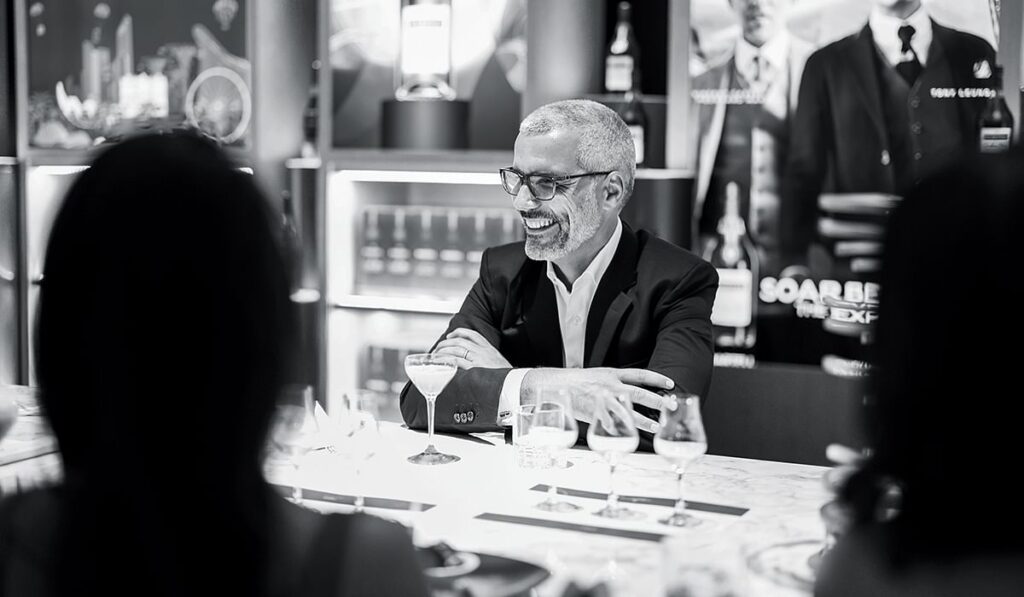Jean Touboul, the managing director of the global wine and spirits group’s Southeast Asia office says sustainability can drive innovation and attract talent.
by Lauren Tan / July 28, 2022
Jean Touboul and 70 Singapore-based colleagues headed to the beach on June 16, but it was not a party fuelled by Pernod Ricard’s trove of spirits and wines such as Royal Salute, Martell and Perrier-Jouët. Rather, they were marking Responsib’ALL Day by cleaning up a stretch of Singapore’s coastline.
It was an event during which all 18,500 employees worldwide stop work to participate in socially responsible initiatives. In the past, they have built school playgrounds from scrap material in India, and turned broken production pallets into nesting houses for owls and bats in the US.
(Related: Moet & Chandon is tackling climate change head on)
Bar World of Tomorrow, Pernod Ricard’s new sustainability workshop for bartenders, has also trained upwards of 50 bartenders from top bars such as Jigger & Pony, MO Bar, Atlas, and Manhattan in sourcing and using fresh ingredients, waste management and responsible serving and hosting practices. By 2030, the initiative aims to train 10,000 bartenders worldwide.
In addition to actively supporting the United Nations Sustainable Development Goals (SDGs), the world’s second-largest drinks maker issued a sustainability bond in April, raising 750 million euros (S$1,092 billion), linking the cost of financing to concrete, sustainable targets.
“We believe sustainability is key to the resilience of our business, to drive innovation, attract talent and to really be the consumer-centric company we want to be. Increasingly, consumers expect more and more of us and the brands they consume,” says Touboul, managing director of Pernod Ricard South East Asia, when we meet at L’Atelier Martell, the experiential pop-up space of Pernod Ricard’s flagship cognac.
Do you think the success of sustainability-linked bonds is indicative of investor and consumer expectations towards sustainability?
It is a testament to our roadmap’s credibility and ambition that it has been positively received by our investors. Consumers expect more and more of us and the brands they consume, as do investors. In evaluating a company’s performance, sustainability is becoming more and more important. Long-term, brands that do not resonate with consumers from a sustainability perspective will be share losers. Conversely, we think that brands with the strongest ESG credentials will be able to command a premium.
A company of Pernod Ricard’s size wouldn’t normally use the word “terroir”. However, in agricultural terms, you do.
We produce and source over 100 ingredients from 65 countries. That’s why one of our key commitments is to nurture every terroir and its biodiversity, while responding to the challenges of climate change.
(Related: Corporate sustainability has never looked so sexy)
Our brand companies have worked with our farmers, suppliers, and partners to develop sustainable and regenerative agricultural practices within all our supply chains, including our vineyards. By supporting them, we are encouraging a holistic approach to the entire farming ecosystem. Regenerative agriculture is also as much about people as it is about the land.
In addition to all the talk about sustainability, Pernod Ricard discourages excessive consumption. What should we do to ensure that drinking is enjoyable?
You’re right that drinking should be convivial. “Bringing Good Times from a Good Place” is Pernod Ricard’s vision. We are passionate about bringing people together, inviting them to share authentic experiences, and making new friends every day. We firmly believe you can live a healthy lifestyle consuming our products as long as you consume them sustainably and responsibly. A hangover is never fun. Our advice always is to drink better, not more.
Your efforts to promote sustainability — who do you do it for?
My children are 16, 14, and 9, so it is important that I do it for the next generation. We don’t have time to wait. I believe in science, and science concurs that human activities are altering the earth’s climate. We must correct ourselves by living sustainably.
This is something I have learned since I was a child. My parents taught me how to sort glass bottles from kitchen waste, and since we lived in a coastal city in the south of France, we always had to keep the beaches clean. We only have this one planet and must improve our impact on the environment.
